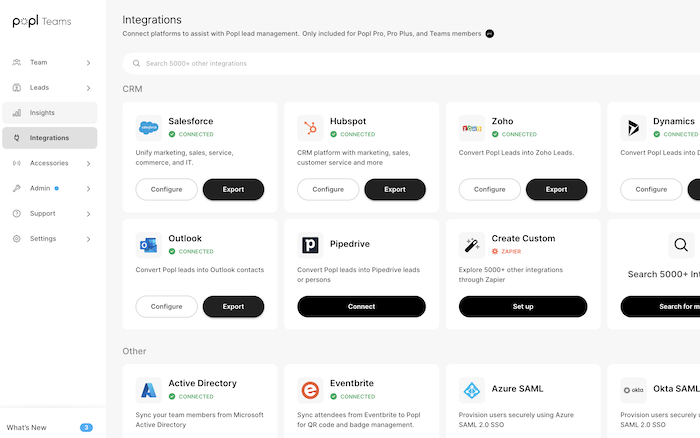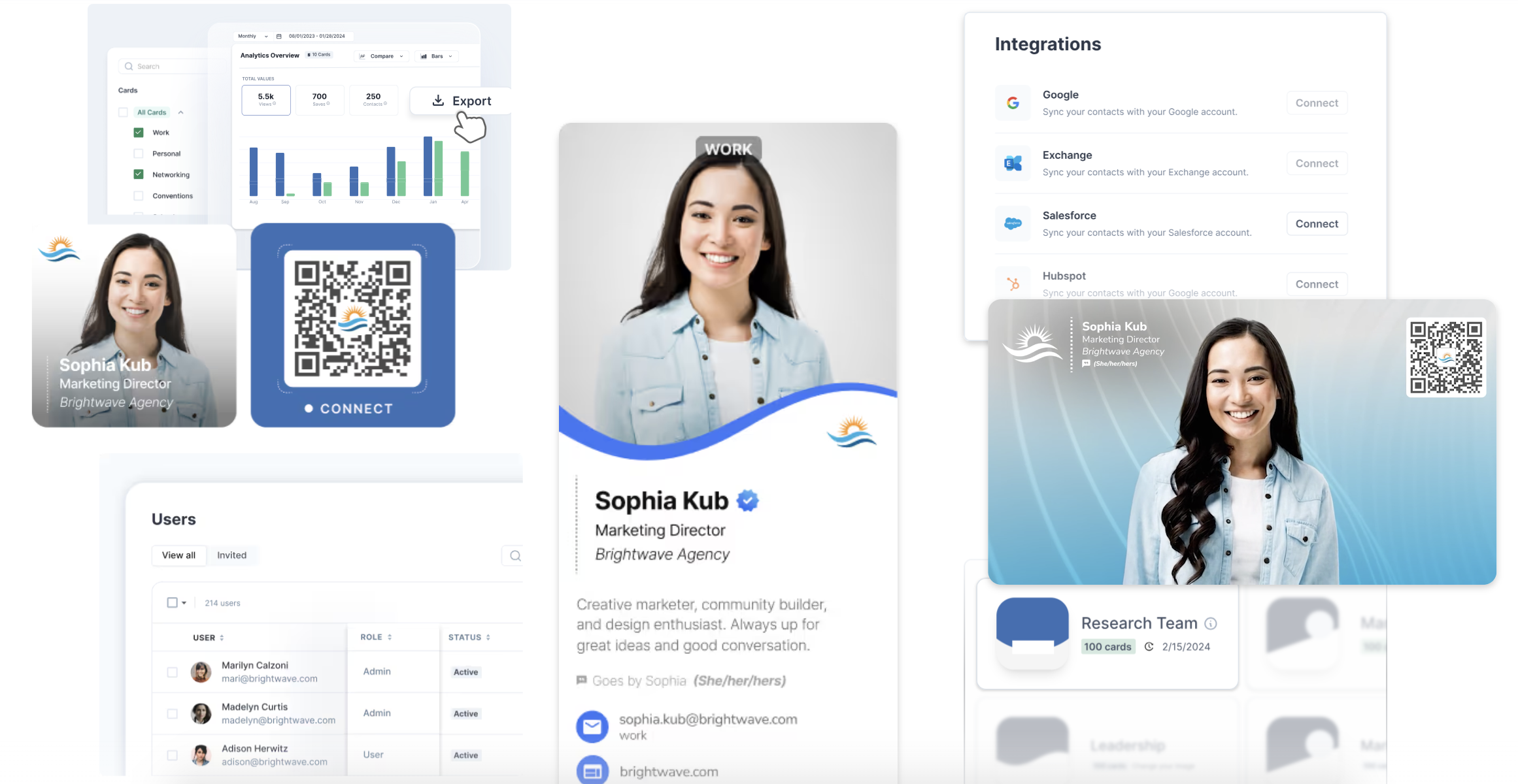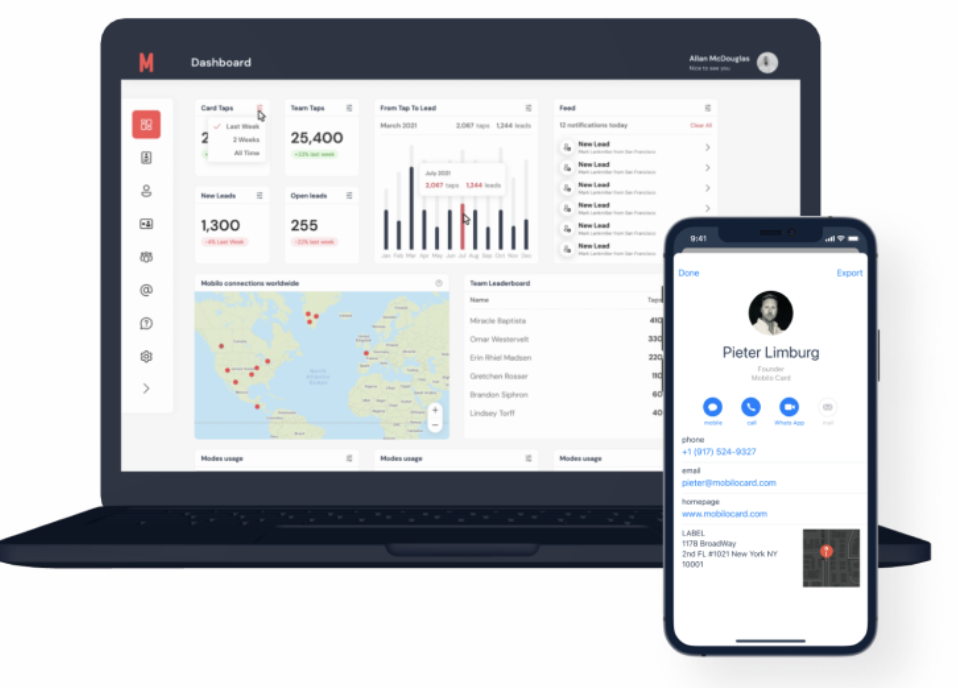
Written by:
Last updated:
Mark Schreuder
November 13, 2025
While individual digital business cards offer convenience for solo professionals, the real power of this technology emerges when deployed across entire teams and organizations. The best digital business card platforms for teams go far beyond simply sharing contacts. They provide centralized management, brand consistency, analytics, and integrations that transform how businesses network at scale.
However, not all digital business card providers are created equal when it comes to team features. Some platforms have invested heavily in robust enterprise capabilities, while others remain focused primarily on individual users.
As former Head of Growth at Blinq (part of the executive leadership team overseeing marketing, sales, customer success, and support), I oversaw 100+ team deployments ranging from 5-person startups to enterprise rollouts of 1,000+ users. I've learned what separates sophisticated team solutions from platforms with basic admin dashboards bolted on as an afterthought.
Full Disclosure: I have previously worked at Blinq, one of the platforms reviewed in this article. However, I've evaluated every platform based on actual team features and real-world performance. Where Blinq's business platform falls short compared to competitors, and it does in several vital areas, I've been fully transparent about those limitations.
Here's my honest assessment of the five best digital business card platforms for teams in 2025, based on real deployment experience and actual capabilities, not marketing claims.
Before diving into our top picks, it's essential to understand what separates exceptional team platforms from basic offerings:
Overall Rating: 5/5
Popl has invested more heavily in team features than any competitor, building the most sophisticated and feature-rich business platform in the industry. While some others treat team offerings as an afterthought, Popl has made enterprise capabilities a core focus.

Popl Teams is ideal for mid-size to enterprise organizations that need sophisticated team management, detailed analytics, and seamless CRM integration. It's powerful for businesses where in-person events and networking ROI matter. Based on my evaluation of all major platforms, Popl offers the best balance of comprehensive features and usability for most team deployments.
Overall Rating: 4.5/5
HiHello has established itself as a strong choice for teams, offering a comprehensive suite of business features with particular strength in enterprise environments and larger organizations.

HiHello excels at enterprise deployments with its security features, compliance certifications, and white-label capabilities. The platform is powerful for organizations with strict IT requirements or those needing extensive customization.
While HiHello's team features are solid, they don't match Popl's depth in analytics and organizational management. The mobile app experience, while functional, isn't as polished as Popl's.
Overall Rating: 4/5
Mobilo has been steadily expanding its team capabilities and offers a competitive option for businesses seeking a balance between individual features and organizational tools.

Mobilo offers good value for money, with competitive pricing and a continually expanding feature set. They are a strong option for businesses that prioritize lead generation features or are looking for a range of NFC card options (e.g., bamboo, metal) to provide to their employees. The platform works well for sales-focused teams of 10-100 users, though it lacks the organizational depth of Popl for larger deployments.
Overall Rating: 3.5/5
Blinq has built one of the most polished and user-friendly individual digital business card apps on the market. However, their team platform hasn't received the same level of development focus, making it more suitable for smaller teams with basic needs.
Blinq's mobile app experience is exceptional and often rated as one of the best in the industry for individual users. The interface is clean, modern, and incredibly easy to use, resulting in high adoption rates among team members who use the app daily. But the business platform has notable gaps compared to competitors:
As such, Blinq works best for smaller teams (under 25 users) that prioritize an excellent end-user app experience over administrative features and analytics. It's also suitable for teams that don't need to track performance metrics or manage complex organizational structures.
However, for most businesses seeking a robust team solution, the limitations of Blinq's business platform make it difficult to recommend over more comprehensive alternatives like Popl or HiHello. This is coming from someone who worked there - if analytics and admin controls matter to your business, choose Popl.
Overall Rating: 3.5/5
Linq provides a straightforward team solution focused on core functionality without overwhelming complexity.
Linq is user-friendly and easy to deploy with minimal training required. Their physical products are of high quality and offer a range of good design options. While Linq lacks advanced capabilities like organizational hierarchies and detailed analytics, it provides a solid solution for companies that need basic functionality and value simplicity over advanced features. Best suited for teams under 20 users who don't require complex admin tools.
You might notice some popular platforms missing from this list. The market has dozens of options, but not all have invested equally in team functionality. The five platforms highlighted here have each made meaningful investments in their team offerings and can reliably serve business needs, though with varying levels of sophistication.
When choosing a digital business card platform for your team, consider these factors:
For most organizations seeking a comprehensive team solution, Popl Teams stands out as the clear winner. Their investment in sophisticated team features, combined with an excellent user experience and robust analytics, makes them the best all-around choice for businesses serious about digital networking.
HiHello serves as a strong alternative for large enterprises with specific security needs or those requiring white-label capabilities. Mobilo, Linq, and Blinq each have their niches but lag behind the leaders in overall team functionality.
The key is aligning your choice with your specific business needs, organizational structure, and growth plans. While individual features matter, remember that a truly effective solution balances powerful administrative capabilities with an app that employees will actually want to use. Popl currently strikes that balance better than anyone else.
Take advantage of free trials and demos to test platforms with your team before making a commitment. The digital business card you choose will become a core part of how your organization networks and generates leads, so it's worth taking the time to make the right choice.
Ready to choose your platform? Start with demos of Popl and HiHello to compare their admin dashboards firsthand. For more background, read my complete guide to digital business cards or see my review of the best individual digital business card apps for detailed feature comparisons.
Mark Schreuder served as Head of Growth at Blinq (part of the executive leadership team overseeing marketing, sales, customer success, and support), where he oversaw 100+ team deployments ranging from 5-person startups to enterprise rollouts of 1,000+ users. This hands-on experience with team implementations, combined with deep knowledge of Blinq's platform architecture and limitations, provides unique insight into what actually works when scaling digital business cards across organizations.
This review is based on:
What is the best digital business card platform for teams?
Popl Teams is the best overall platform for most organizations, offering the most comprehensive features, advanced analytics, and support for complex organizational structures. HiHello is the best choice for large enterprises requiring white-label capabilities and enhanced security certifications. Based on my experience overseeing 100+ team deployments at Blinq, Popl offers the best balance of features and usability for teams of 20-500+ users.
How much do team digital business cards cost?
Team digital business card platforms typically cost $4-10 per user per month when paying annually. Mobilo starts at $4/user/month, HiHello Business at $5/user/month, Blinq at $4.99/user/month, and Popl Teams at $6.99/user/month. Most platforms require a minimum of 5 users and offer volume discounts for larger teams (50+, 100+, 500+ users). Enterprise pricing is available with custom quotes for teams of over 100 users.
Can digital business card platforms integrate with our CRM?
Yes, all major team platforms integrate with popular CRM systems. Popl, HiHello, and Mobilo offer native integrations with Salesforce, HubSpot, Pipedrive, Dynamics 365, and others. These integrations automatically sync captured contacts into your sales pipeline, eliminating manual data entry. Some platforms also offer Zapier integration for connecting to thousands of additional tools.
What's the difference between individual and team digital business cards?
Team platforms add centralized administration, brand template enforcement, team analytics, organizational hierarchy support, bulk management tools, and CRM integrations. Individual plans lack these business features and focus on personal networking needs. Team platforms also typically include user management, permissions, and the ability to onboard/offboard employees efficiently.
How do we ensure brand consistency across team members?
All platforms reviewed offer template systems that lock design elements while allowing personalization. Admins create branded templates with company colors, logos, and approved layouts. Team members can edit their contact information and add personal details, but cannot change brand elements like colors, fonts, or logos. This ensures every card reflects company branding guidelines.
Which platform is best for small teams (under 20 people)?
For smaller teams, Blinq offers the best user experience with its intuitive mobile app, though it lacks analytics. Linq provides good simplicity for basic needs. Mobilo offers the best value for small teams that still need analytics and CRM integration at $4/user/month. For teams under 10 users, individual plans may be more cost-effective than team platforms.
Do team platforms work offline at events?
Yes, most platforms cache card data for offline sharing. Popl is particularly strong for event scenarios with its offline mode and badge scanning capabilities. This ensures your team can network effectively, even with poor WiFi connectivity, which is quite common at conferences and trade shows. Contacts sync automatically once connectivity is restored.
What analytics can we track with team platforms?
Analytics vary significantly by platform. Popl offers the most comprehensive tracking: card views, profile clicks, contact saves, link engagement, geographic distribution, and team performance metrics. HiHello and Mobilo provide good analytics focused on engagement and lead tracking. Linq offers basic metrics. Blinq provides no analytics whatsoever. If measuring networking ROI matters to your business, analytics depth should be a primary selection criterion.